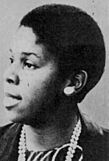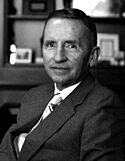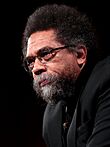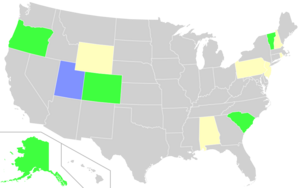United Citizens Party facts for kids
Quick facts for kids
United Citizens Party
(Patriot Party of South Carolina) |
|
|---|---|
| Founded | 1969 |
| Split from | Democratic Party |
| Ideology | Progressivism Black nationalism |
| Political position | Center-left to left-wing |
| National affiliation | Reform (1996) |
| Website | |
| Archived Website | |
The United Citizens Party (UCP) is a political party in the United States. It started in 1969 in South Carolina. John Roy Harper II and others created it. They wanted to help Black candidates get elected. The party formed because the main Democratic Party in South Carolina did not want to support Black candidates.
The UCP's goal was to elect Black people to government jobs. This included positions in the state legislature and local offices. In 1970, the UCP helped elect the first three Black candidates to the South Carolina House of Representatives. This was the first time since the Reconstruction period.
Contents
History of the United Citizens Party
How the Party Started
John Roy Harper II was the first president of the United Citizens Party. He was chosen at the party's first meeting on April 13, 1970. Harper said he left the Democratic Party. He did this because they would not support Black candidates.
In 1970, the UCP had Thomas Broadwater run for Governor. The party's main idea was to create a separate party. This party would run people who would listen to what the people wanted. They also felt that white politicians had not kept promises to Black people.
In 1972, the UCP helped George McGovern get on the ballot for president. This was for his campaign against Richard Nixon. The UCP's efforts also helped Black South Carolinians get elected to the House. This happened even though the UCP did not elect its own candidates that year.
The Party's First Comeback
After 1972, the party did not run many candidates and became quiet. However, in 1986, new election laws in South Carolina changed things. Parties now had to run candidates in at least every other election.
In 1988, a group called the New Alliance Party helped the UCP. They filed paperwork for Lenora Fulani to run for President. She ran again as a UCP candidate in 1992. During this time, Fulani changed the party's name to the Patriot Party (PP). She also worked with supporters of Ross Perot to create a national party for him.
In 1996, Perot's new Reform Party (RP) also got on the ballot in South Carolina. This meant Perot appeared twice on the ballot. He was listed for the Reform Party and for the Patriot Party. The Patriot Party helped Perot get more votes in South Carolina. After this, Perot's supporters joined the Reform Party. This made the Patriot Party quiet again.
The Party's Second Comeback
In 2000, Michael Avey, a professor, and some friends took over the quiet Patriot Party. They asked the Federal Election Commission to change the name back to the United Citizens Party. Ralph Nader ran as the UCP candidate in his 2000 presidential campaign.
The party's original founder, John Roy Harper II, supported Avey's efforts. He said that the problems the United Citizens Party wanted to fix were still there. He felt that Black politicians needed more support to make a difference.
In the 2002 election, Mark Whittington ran for Congress in South Carolina. He received a good number of votes. Kevin Alexander Gray, an activist, also tried to run for governor. He was a candidate for the South Carolina United Citizens’ Party and the South Carolina Green Party. He ran as a write-in candidate.
Presidential Elections in the 2000s
In the 2004 United States presidential election, the UCP chose to support Walt Brown. He was the candidate for the Socialist Party. In 2006, the party supported John "JC" Nelums for State House District 79.
For the 2008 United States presidential election, the party supported Barack Obama. However, Obama ran only as the candidate for the Democratic Party.
In 2010, the party supported Morgan Bruce Reeves for governor. He also had support from the South Carolina Green Party. Reeves ran for governor again in 2014. In 2018 and 2022, Chris Nelums ran as a UCP candidate for Commissioner of Agriculture. He received many votes in both elections.
Presidential Elections in 2024
For the 2024 United States presidential election, the UCP chose to support Cornel West for president. Other UCP candidates in 2024 included Gregg Marcel Dixon. He ran for South Carolina's 6th Congressional District. Chris Nelums also ran for State Senate District 19.
Presidential Candidates Supported by the UCP
- 1972 – George McGovern
- 1984 – Dennis Serrette
- 1988 – Lenora Fulani
- 1992 – Lenora Fulani
- 1996 – Ross Perot
- 2000 – Ralph Nader
- 2004 – Walt Brown
- 2008 – Barack Obama
- 2024 – Cornel West
See also
- Peoples, Betsy. Historically Black political party still alive. The New Crisis. Nov/Dec 2002.






